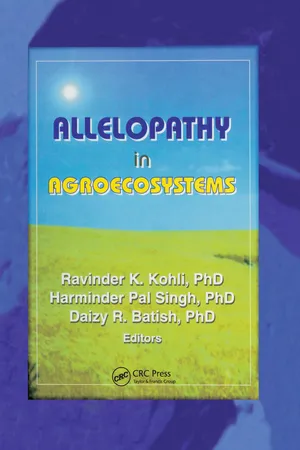
Allelopathy in Agroecosystems
- 464 pages
- English
- ePUB (mobile friendly)
- Available on iOS & Android
Allelopathy in Agroecosystems
About this book
Discover environmentally safe ways to control weeds and pests!
Until now farmers have had to choose between using expensive herbicides and fertilizers, which pollute the water table, or watching crop yields drop. All too often, crop yields dropped anyway, despite intensive farming. Allelopathy in Agroecosystems offers fresh hope. It provides an in-depth understanding of allelopathy-the mysterious, complex biochemical interactions among plants and microbes. This little-understood phenomenon plays a large role in agriculture, for good or ill. It can lead to changes in nutrient dynamics, vegetation structure, and species diversity.
This comprehensive treatise is the first compendium devoted to explaining and exploring these chemical interactions in agricultural crop systems. Allelopathy in Agroecosystems explains how these interactions can make soil "sick," especially in intensively cropped areas. This leads to less growth and lower yield. On the other hand, it has great potential as an environmentally safe method of weed and pest management. The fascinating original research presented here will help you understand the complexities of this invisible yet potent force in agriculture.
Allelopathy in Agroecosystems examines this interaction as it affects the most important concerns of farmers and agronomists, including:
- beneficial interactions between crops
- weed control using crop residues
- crop rotation
- natural herbicides
- genetic engineering
- soil rhizosphere bacteria
- improving pastures
- forest/crop interactions
- sustainable management of agroecosystems
- new directions for research
International in scope, Allelopathy in Agroecosystems offers an abundance of scientific data on this revolutionary new concept. It offers incalculable potential for rescuing farmed-out land, increasing crop yields, and cutting back on expensive soil additives. Every agronomist, environmental scientist, policymaker, agricultural librarian, and advocate of sustainable farming needs this book.
Tools to learn more effectively

Saving Books

Keyword Search

Annotating Text

Listen to it instead
Information
Table of contents
- Cover
- Half Title
- Series
- Title
- Copyright
- Contents
- Foreword
- Preface
- Allelopathy in Agroecosystems: An Overview
- Weed Allelopathy, Its Ecological Impacts and Future Prospects: A Review
- Crop Allelopathy and Its Role in Ecological Agriculture
- Weed Control with Crop Residues in Vegetable Cropping Systems
- Allelopathic Influence of Decomposing Wheat Residues in Agroecosystems
- Significance of Allelopathy in Crop Rotation
- Selective Isolation and Screening of Soil Microorganisms for Metabolites with Herbicidal Potential
- The Use of Allelopathic Studies in the Search for Natural Herbicides
- Screening and Future Exploitation of Allelopathic Plants as Alternative Herbicides with Special Reference to Hairy Vetch
- Japanese Research and Developments on Plant Pathogens as Weed Control Agents
- Allelopathic Potential in Rice Germplasm Against Ducksalad, Redstem and Barnyard Grass
- Effects of Application of Alfalfa Pellet on Germination and Growth of Weeds
- Allelopathic Effects of Some Volatile Substances from the Tomato Plant
- Growth Stage of Cyperus esculentus Influences Its Allelopathic Effect on Ectomycorrhizal and Higher Plant Species
- Autotoxic Potential of Cucurbit Crops: Phenomenon, Chemicals, Mechanisms and Means to Overcome
- Effects of Alfalfa Saponins on In Vitro Physiological Activity of Soil and Rhizosphere Bacteria
- Activity and Persistence of Sorgoleone, a Long-Chain Hydroquinone Produced by Sorghum bicolor
- Role of Benzoxazinones in Cereals
- Allelopathic Research in Permanent Improved Pastures of Inland Temperate Australia
- Allelopathy in Agroecosystems in Spain
- Index
Frequently asked questions
- Essential is ideal for learners and professionals who enjoy exploring a wide range of subjects. Access the Essential Library with 800,000+ trusted titles and best-sellers across business, personal growth, and the humanities. Includes unlimited reading time and Standard Read Aloud voice.
- Complete: Perfect for advanced learners and researchers needing full, unrestricted access. Unlock 1.4M+ books across hundreds of subjects, including academic and specialized titles. The Complete Plan also includes advanced features like Premium Read Aloud and Research Assistant.
Please note we cannot support devices running on iOS 13 and Android 7 or earlier. Learn more about using the app